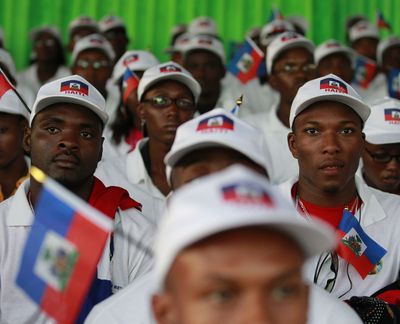Senegal welcomes 163 Haitians
Poor country offers home to victims of earthquake

DAKAR, Senegal – Senegal is one of the poorest countries in the world and its GDP is only marginally higher than Haiti’s, but that hasn’t stopped the government from going ahead with a plan to offer a new home to 163 victims of Haiti’s catastrophic earthquake who arrived on a chartered jet Wednesday.
The young men and women stepped off the plane to a raucous welcome, including dancers that pounded the pavement in costumes made of cowrie shells and traditional praise singers who shouted accolades into megaphones.
Senegalese students waited by the dozens holding up signs that said: “Welcome to the home of your ancestors.”
The 163 students are the first batch of arrivals from Haiti in a grand scheme that began when President Abdoulaye Wade saw images of the devastated Caribbean nation following the January quake.
He was moved to help, arguing that Haitians are the sons and daughters of Africa because their ancestors were taken from the continent as slaves. French is the main language of Senegal, while Haitians speak French-derived Creole.
He initially offered free land to the quake victims, and the attempt to help them has become one of the main planks of Wade’s larger goal of creating a global African community, which includes a proposal to unite the continent into a single country.
He was criticized at home when he went so far as to say that he would be willing to hand over a region of Senegal if a large number of Haitians were to agree to relocate here.
The project has since been scaled back and the students will receive free housing – not land. They will also be offered scholarships in a nation where the campus of Senegal’s largest university is frequently paralyzed by strikes because of the late payment of scholarships.
“This is a historic day,” said airport security guard Abdou Salam, who leaned against the peeling blue wall of the airport’s VIP room in the hours before the chartered jet landed. “But it’s a little weird. We’re chartering a plane and giving them free scholarships, and yet we know that our own students can sometimes go six months without seeing their payments.”
Others say that Senegal’s poverty – where nearly half the working age population is out of work and where even those that do have jobs bring home around $130 a month – is in fact the reason it should be helping Haiti.
“We are giving the rest of the world a lesson in humanity. Senegal has shown that it’s in the hearts of the poor that you can find the gift of generosity,” said historian Iba Der Thiam, currently vice president of the National Assembly.